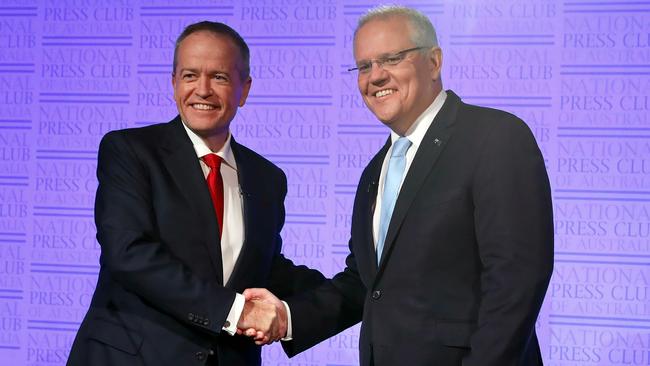
Apart from the pall it has cast over the last day of this election campaign, the passing of Bob Hawke has highlighted how our politics have diminished. Hawke and John Howard stand head and shoulders above the rest of our post-Menzies leaders and there are clear reasons.
Hawke, like Howard, took the prime ministership to achieve change and improve the nation according to long held and well-considered beliefs. Hawke’s greatest assets were his conviction, and the determination and advocacy skills that enabled him to deliver on them — his charisma was an added bonus.
Election 2019 verdict: Week one | Week two | Week three
The contrast with the current crop is stark. Both Kevin Rudd and Tony Abbott came to power with strong surges of conviction; in Rudd’s case it turned out to be fake and in Abbott’s case his mistakes and his party’s cowardice saw it overturned.
We have been left with major parties going through identity crises. Shorten’s pedestrian campaign has attempted to argue an economically irrational agenda that is the antithesis of Hawke/Keating aspirational reform. Morrison’s energetic campaigning has tried to plot a centrist path back to the Coalition’s core values without upsetting the seething moderates and conservatives in his ranks.
The substance of the election pitches favours Morrison and the Coalition; they have secured the borders, lowered taxes, repaired the budget and kept the nation on a course of steady, if precarious, economic recovery. Labor has a tax and spend agenda fraught with risk and a climate and energy policy that is so frightening the Labor Leader has stubbornly resisted any attempt to put a figure on its cost to consumers and the economy.
For this reason of obfuscation and avoidance, Shorten has lost every week of the campaign. Commenters on these weekly assessments have criticised me for not pretending Shorten won a week but to award the opposition leader a week when he has thumbed his nose at voters by refusing to address the substance of the contest is to reduce analysis to Twitter levels. I won’t do that.
Still, such has been the vandalism inflicted on itself by the Coalition over the past few years that despite Labor’s mistakes and Morrison’s flawless advocacy, it is still expected to lose. I said in the first of these weekly assessments that Morrison needed to win every week to have any chance of winning. He has won each week, some more emphatically than others, and while he does have some chance still of pulling off a miracle victory, Labor remains favourite.
Shorten has avoided direct engagement throughout the campaign, doing the bare minimum. This week he skipped the National Press Club to front a confected rally in Blacktown, invoking the memory of Gough Whitlam to try and conjure some momentum for change.
He would have done better to invoke the memories of Hawke and Paul Keating, embracing the aspirations of middle Australia and looking to free up the economy, rather than reverting to class warfare, redistribution and ever bigger government.
For all the focus on Labor’s agenda perhaps the Coalition campaign has not focused strongly enough on it. Perhaps too much has been left to Morrrison with a deliberate decision to limit media appearances by other Coalition MPs.
Shorten has used his frontbenchers to tackle detail and deliver attacks. He has been given a rails run by a compliant media, with journalists who have long predicted an emphatic Labor victory seemingly loath to interrogate him lest they do too much damage to their own predictions.
A country that has done itself enormous harm on the incomplete path to a 23 per cent renewable energy target and 26 per cent emissions reduction goal might just take a punt on bumping the RET up to 50 per cent and the emissions cut to 45 per cent. It can only hurt a lot of people and will deliver absolutely zero environmental benefit because global emissions will continue to rise sharply.
One guiding principle I have enthusiastically adopted from Hawke and Howard is to never underestimate the intelligence of the Australian voting public. Hawke always deliberately flattered the intelligence of voters and both men invited to public to discuss and embrace difficult reform.
If the nation opts to change government now, under these economic conditions and with the proposals currently on offer, it will shake this precept. Could the electorate as a whole take such an unwise risk?
Yet in the end, most of the blame will lie with the Coalition MPs whose job it was to implement their plans while maintaining a path of least resistance for voters. They chose instead to erect a series of mindless obstacles on the road to Coalition support.
Shorten has been clever enough to capitalise on this but as every day of the campaign has progressed, more and more people have become sceptical of his agenda. For Shorten and Labor, 6pm tomorrow night cannot come soon enough.


